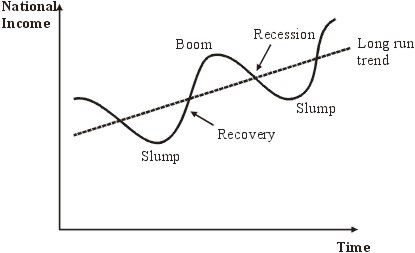|
Business & the Trade Cycle |
National Income |
|
National income is can be measured in several ways which are also all related to each other. The two most important measures are GDP (Gross domestic product) and GNP (Gross National Product). GDP measures the total value of goods and services produced within an economy, but does not take into account revenues and payments to and from the country to other countries. GNP does take this into account. GNP adds and subtracts the value of earnings and payments of from anywhere in the world.
|
|
The Trade Cycle |
|
The economy goes through periods of “booms” and “slumps”. These ups and downs are called the trade cycle.
|
|

|
|
|
The Trade Cycle
|
|
|
A recession affects firms in different ways. Firms produce either “inferior” or “superior” goods. But note here the term “inferior” does not mean “bad”. What it means is that the good is a basic type of good and that when people's incomes increase they prefer other types of goods with more “features”, in other words, luxury or “superior” goods. An inferior good is a good that people buy when their income falls; a superior good is a good that people buy when their income rises.
|
|
|
In a recession people's incomes generally fall, though even that is a generalisation, since some people's incomes might rise during a recession, whilst other people's income fall. However, generally speaking, in a recession demand for superior goods falls whilst demand for inferior goods rises. Thus, a producer of a superior good can expect to be badly affected by a recession.
|
|
|
For such firms, the effects of a recession are: (1) demand for their products falls; (2) firms have to respond by cutting back on overtime or by making redundancies; (3) consumers are more sensitive about prices; (4) firms may see stocks increase, and may have to respond by decreasing production.
|
|
|
Industries that are particularly sensitive to recessions are housing, construction and car manufacture. On the other hand, food and the pharmaceutical industries are usually not affected by a recession.
|
|